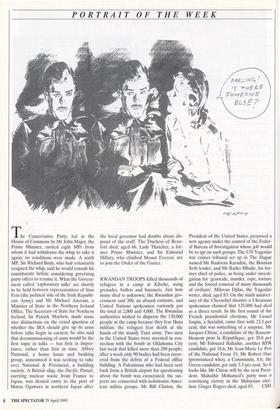PORTRAIT OF THE WEEK
The Conservative Party, led in the House of Commons by Mr John Major, the Prime Minister, invited eight MPs from whom it had withdrawn the whip to take it again; no conditions were made. A ninth MP, Sir Richard Body, who had voluntarily resigned the whip, said he would consult his constituents before considering governing party offers to resume it. What the Govern- ment called 'exploratory talks' are shortly to be held between representatives of Sinn Fein (the political side of the Irish Republi- can Army) and Mr Michael Ancram, a Minister of State in the Northern Ireland Office. The Secretary of State for Northern Ireland, Sir Patrick Mayhew, made some nice distinctions on the vexed question of whether the IRA should give up its arms before talks begin in earnest; he also said that decommissioning of arms would be the first topic in talks — but first in impor- tance, rather than first in time. Abbey National, a home loans and banking group, announced it was seeking to take over National & Provincial, a building society. A British ship, the Pacific Pintail, carrying nuclear waste from France to Japan, was denied entry to the port of Mutsu Ogawara in northern Japan after the local governor had doubts about dis- posal of the stuff. The Duchess of Beau- fort died, aged 66. Lady Thatcher, a for- mer Prime Minister, and Sir Edmund Hillary, who climbed Mount Everest, are to join the Order of the Garter.
RWANDAN TROOPS killed thousands of refugees in a camp at Kibeho, using grenades, bullets and bayonets. Just how many died is unknown; the Rwandan gov- ernment said 300, an absurd estimate, and United Nations spokesmen variously put the total at 2,000 and 4,000. The Rwandan authorities wished to disperse the 130,000 people at the camp because they fear Hutu militias; the refugees fear death at the hands of the mainly Tutsi army. Two men in the United States were arrested in con- nection with the bomb in Oklahoma City last week that killed more than 200 people; after a week only 90 bodies had been recov- ered from the debris of a Federal office building. A Palestinian who had been sent back from a British airport for questioning about the bomb was exonerated; the sus- pects are connected with isolationist Amer- ican militia groups. Mr Bill Clinton, the President of the United States, proposed a new agency under the control of the Feder- al Bureau of Investigation whose job would be to spy on such groups. The UN Yugoslav war crimes tribunal set up in The Hague named Mr Radovan Karadzic, the Bosnian Serb leader, and Mr Ratko Mladic, his for- mer chief of police, as being under investi- gation for 'genocide, murder, rape, torture and the forced removal of many thousands of civilians'. Milovan Djilas, the Yugoslav writer, died, aged 83. On the ninth anniver- sary of the Chernobyl disaster a Ukrainian spokesman claimed that 125,000 had died as a direct result. In the first round of the French presidential elections, Mr Lionel Jospin, a Socialist, came first with 23.3 per cent; this was something of a surprise. Mr Jacques Chirac, a candidate of the Rassem- blement pour la Republique, got 20.8 per cent; Mr Edouard Balladur, another RPR candidate, got 18.6; Mr Jean-Marie Le Pen of the National Front 15; Mr Robert Hue (pronounced who), a Communist, 8.6; the Green candidate got only 3.3 per cent. So it looks like Mr Chirac will be the next Presi- dent. Mahathir Mohamed's party won a convincing victory in the Malaysian elec- tion. Ginger Rogers died, aged 83. CSH


























































 Previous page
Previous page